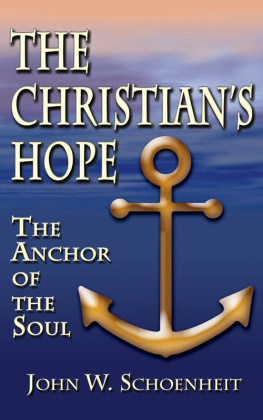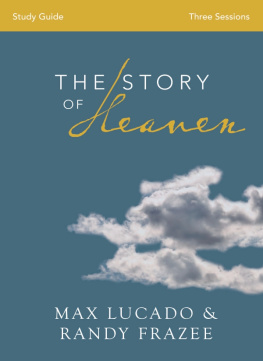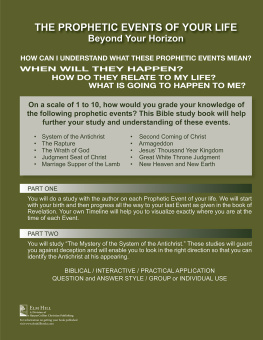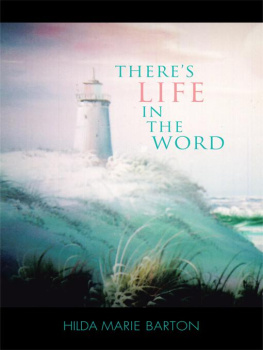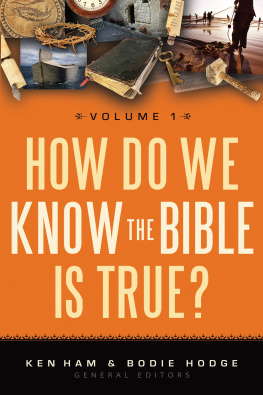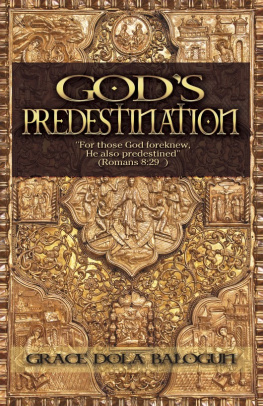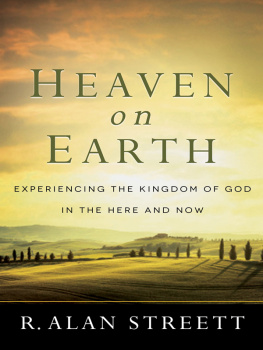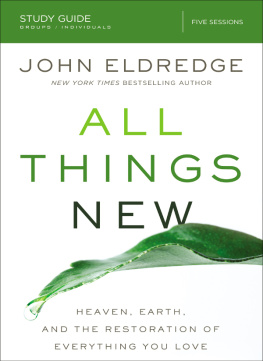Chapter One
Our Valuable Anchor
In order to properly understand the Christians hope, it is important to examine the exact meaning of the word hope. Hope means a desire for, or an expectation of, good, especially when there is some confidence of fulfillment. It is used that way both in common English and in the Bible. However, the Bible often uses the word hope in another wayto refer to the special expectation of good that God has in store for each Christian in the future. This includes the Rapture, receiving a new, glorified body, and living forever in Paradise. Today, the ordinary use of hope allows for the possibility that what is hoped for will not come to pass. However, when the Bible uses the word hope to refer to things that God has promised, the meaning of hope shifts from that which has a reasonable chance of coming to pass to that which will absolutely come to pass. To be a useful anchor, hope must hold fast.
A biblical occurrence of hope as an expectation of good can be found in Acts 27:20. Paul was on a ship bound for Rome. A storm came up and raged for many days, such that we finally gave up all hope of being saved. Another example is in 3 John 14 where the apostle John wrote to his friend Gaius and said, I hope to see you soon, and we will talk face to face. These are examples of the Bible using the word hope in the way it is used in everyday language, such as when someone says, I hope it rains this week, or I hope you feel better. There are also many biblical examples of the word hope referring to everlasting life and the blessings associated with it. Colossians 1:23 mentions the hope held out in the gospel, i.e., the expectation of future good presented in the gospel.
It is unfortunate that the word hope has come to be used in common English as a synonym for wish. In the sentence, I hope it will rain this week, the word hope, if properly used, implies a certainty or confidence that it will, in fact, rain. If there is no such confidence, then it would be more proper to say, I wish it would rain this week.
As noted above, when the Bible uses the word hope in reference to events in the future, there is no doubt at all that the events will occur. The book of Titus contains a usage of hope referring to the believers expectation of everlasting life:
Titus 1:1 and 2
(1) Paul, a servant of God and an apostle of Jesus Christ for the faith of Gods elect and the knowledge of the truth that leads to godliness
(2) a faith and knowledge resting on the hope of eternal life, which God, who does not lie, promised before the beginning of time.
This is a good example of the word hope referring to our expectation of everlasting life. In this case, it implies more than just a desire or a wish. It is an expectation of the future that will absolutely come to pass. God, who does not lie, made many promises about the future everlasting life of the believer. Although we may not know when He will fulfill those promises, we can be absolutely certain that He will fulfill them.
The Bible has a great deal to say about the future life in Paradise that saved people will enjoy. God speaks about the future for a reason: He wants each and every Christian to make up his mind to obey Him and to be committed to Him in good times and in bad times. History and experience both show that it is difficult to make and keep a Christian commitment. Many people commit to the Lord for a while, but then, for various reasons, abandon their commitment. Many once-dedicated Christians have stopped praying, reading the Bible, fellowshipping with other Christians, etc., for all sorts of reasons. God speaks about the future to provide hope so that believers will have an anchor for their souls; an anchor to hold them steadfast to Him. Hebrews 6:19 says, We have this hope as an anchor for the soul, firm and secure.
Gods use of the anchor to represent the believers Hope is appropriate and poignant. An anchor keeps a boat from drifting away with the currents or being blown away in a storm. Thus, using an anchor to describe the purpose of the Christian Hope makes perfect sense. When a Christian has a clear picture of what he is hoping for in the future, especially the rewards that the Lord will give to those who have earned them, it helps to keep him from drifting away from his commitment and becoming involved with the sinful pleasures and abundant temptations offered by the world. It also helps to prevent him from being blown away from God during the storms of life.
Because the Hope was referred to as an anchor, the anchor was the earliest known Christian symbol. It was used to represent the Hope of resurrection unto everlasting life. At Pompeii, the Roman city buried by lava in 79 AD when Mt. Vesuvius erupted, a ring was discovered with a beautiful image of an anchor and the Greek word elpis, hope, inscribed on it.
The Adversary has made a concerted attack on the subject of the Hope because of the value that it has to anchor people to godliness and truth. An accurate knowledge of the Hope will anchor Christians by energizing and strengthening them to endure pressures and pleasures in a way that nothing else is able to do. People without hope become defeated, broken, and unable to cope with adversity. Hopeless people give up. If Christians are going to stay energized and motivated to do the work of the Lord day in and day out, putting up with all the trouble that the Devil and people put them through, it is vital to have a hope that is real, alive, and vivid.
The strengthening and energizing value of hope shows up in many ways in everyday life. When a mother tells her hungry family that dinner will be ready in ten minutes, she gets a totally different response than if she says she does not know when it will be ready. The hope of eating soon gives the family the energy to hold on a little longer. Having hope is vital in the medical field. Modern medicine acknowledges the healing value of hope because hopeful people have more strength and endurance. A mother will tell a sick child that the medicine will make him feel better soon because that helps the child stay positive and endure the pain.
Having a hope in the form of a visible goal is also important in athletic performance. Every coach knows the value of yelling, Last lap! to the runner or swimmer whose muscles are already screaming from fatigue. Hearing One more lap! causes the athlete to reach deep and find the energy to push through to the end. Runners, skiers, skaters, rowers, and other athletes know that muscles that seem to be just holding on somehow come to life and have extra strength when the finish line comes into sight. The hope that the race will soon be over infuses the body with energy that seems to come from nowhere. There is no question that having hope anchors a person to his goal and gives him energy and strength to go on.
Just as hope energizes and strengthens, it is also true that being without hope drains ones strength. The feeling of being hopeless is devastating. A person with no hope, with no expectation of good, often sinks into depression and despair and may even commit suicide. The effects of being hopeless are well documented. People who have no hope of everlasting life grieve over death in ways that Christians who are confident of everlasting life do not. Paul wrote to the Thessalonians and told them that the dead Christians would be raised to life when Christ comes down from heaven, with a loud command, with the voice of the archangel and the trumpet call of God (1 Thess. 4:16). Paul knew that when they really had hope in the raising of the dead, they would not grieve like the rest of men, who have no hope (1 Thess. 4:13).
Christian work can be difficult. It is often under-financed and under-appreciated, many times involving endless hours of work in poor conditions for unthankful people. Furthermore, Christians are still human, and so, although it should not be this way, Christian work is often accompanied by envy and jealousy, power struggles, distrust, personal agendas, cliques, backbiting, and other less than desirable things. Why would anyone workoften on a volunteer basisin those conditions? One answer is that many people start out being very idealistic, but idealism usually does not last long in the real world. Without a vivid hope to sustain them, they eventually burn out. Having a vivid hope, however, gives people strength and energy to press on. The mistreatment and lack of appreciation can be dealt with when one realizes that there will be rewards that he or she will receive at the Judgment. Paul wrote about this very thing:
Next page
